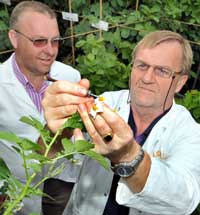OFC 2010: Investment in research vital

Britain’s farming industry will be seriously threatened and the government’s Food 2030 strategy risks being undermined without better investment in agricultural science.
Crop protection was cited as the most important past advancement by 29% of farmers who put it top of a list compiled during research specially commissioned by the Oxford Farming Conference.
It was followed by plant breeding and machinery. Plant breeding scored 18% as the most important future development with GM technology scoring 15%. But one in four farmers remains unsure what scientific advancements are needed.
Agricultural suppliers were seen as the most important current deliverer of agricultural science with a score of 58%. But 57% thought that the government should be the body most responsible for agricultural science development.
The study of 600 farmers by the National Farm Research Unit was carried out in association with dairy nutrition company Volac and the Biotechnology and Biological Sciences Council.
There was also little recognition for the work of scientific research centres and institutions, although many farmers said they believed such establishments would play an important role in the future.
Similarly, there was little appetite for extra investment by farmers through the Agricultural and Horticultural Development Board, with just 10% saying it was responsible for agricultural science research and only 7% saying it should be.
Government funding makes up £276m of the UK’s £365m total spend on agricultural science. The remainder comes from a mixture of trade, the agricultural supply industry agricultural charities and levy payers, including farmers themselves.
Increasing yield and developing resistance to pests and disease were identified as key agricultural science goals. But farmers also recognised the importance of soil and water management if farming is to be sustainable into the future.
Soil management scored 7.3 out of nine when the farmers were asked to rate how important it was. Water management got a score of 6.9 out of nine – only a fraction behind pollution control.
Food industry research was also carried out separately by the IGD. When retailers, food processors, wholesalers and foodservice operators were asked about the usefulness of current agricultural research scored they scored it just five out of 10 suggesting that it lacks commercial focus and fails to meet the needs of farmers and the food industry.
Research expected to be of future importance to the food industry included cultivation methods, climate change, water and nutrition management and improving the quality of crops and meat after harvest or slaughter.
Key future technologies are also expected to include GM; nanotechnology – microscopic materials that can improve production; genomics, particularly in livestock; and new water and soil technology including hydroponics.
Both farmers and the food industry agreed the need for scientific advances to be better communicated with a greater need for demonstration farms and co-operation between researchers, farmers, retailers and processors.
Full research results can be found on the Oxford Farming Conference website.
CURRENT SPENDING ON RESEARCH
Who | £ |
Government Made up of DEFRA – £65m Scottish Executive – £30m Northern Ireland – £7m BBSRC – £150m Funding Council support for universities – £12m Technology Strategy Board – £16m | 276m |
Trade Made up of UK Agricultural Supply Industry – £45m+ UK plant breeders – £10-12m | £56m+ |
Farmers Made up of AHDB – levy payer funding – £22.6m Farmer membership organisations – £3m Agricultural charities – £3.5m | £29.1m |
Overall estimated total for 2010 | 365m |
Source: OFC Research in association with Volac and BBSRC

